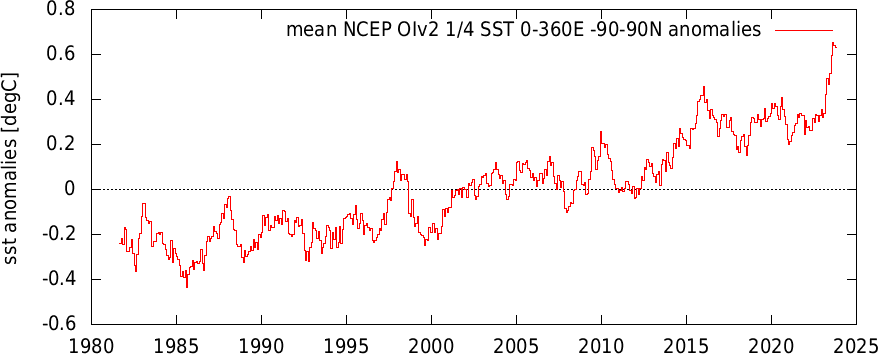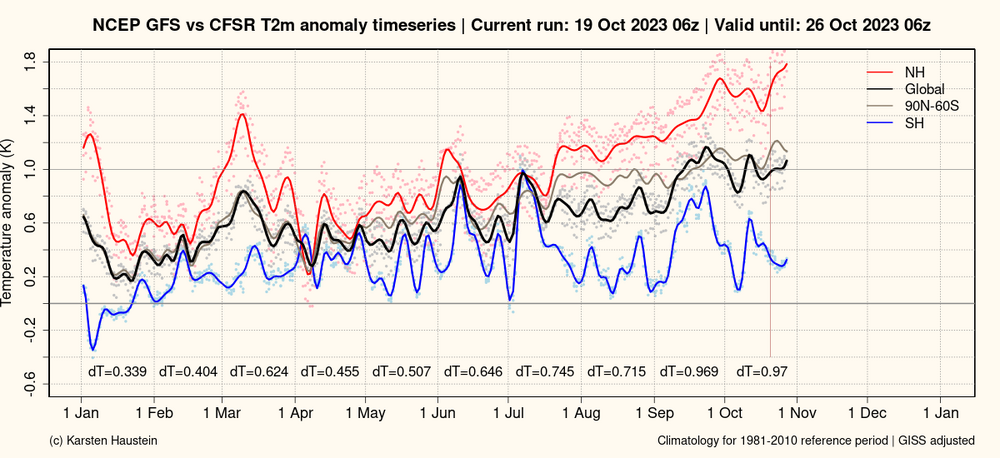
chubbs
Members-
Posts
3,549 -
Joined
-
Last visited
Content Type
Profiles
Blogs
Forums
American Weather
Media Demo
Store
Gallery
Everything posted by chubbs
-
Don, yes not much positive out of COP. However, In terms of fossil fuel competitive position there is continuing change afoot. Below is a recent article on China's industrial policy which led to the development of the "new three": solar, batteries and EV which are now driving export growth. Expect competition to continue to increase among the big industrial powers as clean energy technology is increasingly seen as critical for economic growth. Although last years IRA is a good start, not confident in our ability to play the long game. We'll see. https://energypost.eu/china-is-still-playing-the-long-game-with-its-new-three-solar-cells-lithium-batteries-evs/
-
Don't agree with views ascribed to either in the article. I don't think Hanson's latest paper is definitive vs all the other ECS literature. While warming has been accelerating recently, most of that can be attributed to increased forcing, due to reductions in aerosols. Also not ready to buy off on geoengineering, until more research is conducted. However I also don't think net zero is sufficient as Mann advocates. Net zero allows society to put off tough decisions, while we fill the carbon bathtub at a rapid rate. I doubt we will be able and/or willing to remove carbon at scale to make the "net" a reality or to cure "overshoot". Instead think we need to focus more on near-term emission reductions. Also need to develop the policy to support the development of viable non-carbon options for sectors that are lacking good solutions.
-
Below is an interesting blog article on how natural variability is impacting this years global temperatures. Bottom-line: this year's nino packs an unusually large punch due to sudden flip from nina to nino and warming across all enso regions. Nice job by a retired engineer. https://dmn613.wordpress.com/2023/11/20/more-details-on-sep-oct/
-
First ocean data I've seen that confirms recent CERES net radiation spike.
-
Ceres data global net radiation data for September has become available. Year-over-year values have started to decrease with the 12-month mean peaking in July. Still the decrease in net radiation since the July peak is small considering the large rise in global temperatures this year, which should increase outgoing radiation.
-
After reading the thread was interested in checking the Detroit numbers, below is Detroit Metro with obs back to 1959. Looks similar to what we see locally, about 5F of winter warming. Slow starts to add up after half a century.
-
Agree we are not in a good climate position due to poor policy choices in the past and will end up with a mediocre climate outcome that could have been avoided. However I also think that we have overestimated the economic advantage/benefits of fossil fuels. Turns out solar/wind/EV are better technologies from an economic standpoint that will out-compete fossil fuels in the future. Below is a recent paper that asks the question: Has solar passed an economic tipping point? The answer is yes. Solar will dominate electricity markets in the future even without climate policy. Ten years ago solar (and batteries) were not competitive with fossil fuels, now it is close. 10 years from now solar and batteries will be much cheaper. You are also right that tremendous amounts of money are made with fossil fuels, particularly oil. Oil is a scarce resource, competition is limited and the market isn't entirely free. In contrast solar/wind/ev are highly competitive markets with more participants and much lower profit margins. Another reason to speed up the move away from fossil fuels. Yes all that fossil money has slowed progress; but, as fossil continues to lose the competition race it gets easier to push aggressive non-fossil policies. Expect countries without a big fossil endowment to lead the way. https://www.nature.com/articles/s41467-023-41971-7
-
I am not as pessimistic as you are. Internal combustion is facing stiff competitive headwinds. Fossil fuels aren't getting any cheaper and the long-term oil supply outlook is bleak. Similar story in the power industry, fossil fuels are losing competitive advantage. Won't happen fast enough but the obstacles to better climate policy/reduced fossil fuel use are steadily eroding. https://www.goldmansachs.com/intelligence/pages/electric-vehicle-battery-prices-falling.html
-
-
As forecast, the past two days have broken the recent September CFS anomaly record. Models indicate the spike will be short lived. In general, still following the typical nino timing pattern, well ahead of 2015/16.
-
A decade of warming is roughly 0.2C. We've had a 2fer, roughly 2 decades of warming in one decade. Who predicted that?
-
Huh? Sure the CO2 increase is gradual. The build-up of the earth's energy balance is also gradual as is the increasing heat content of the oceans. However, ENSO makes the global temperature increase look uneven. If you average temperature over 11 years (red line in chart below) most of the enso variability is removed and the temperature increase becomes steady. The Tonga volcano has been over-hyped by skeptics like Maue. There are posts in this thread with model results showing modest volcano impacts this year, net cooling in one study. If you are worried about increasing water vapor in the atmosphere, worry about greenhouse gases. Water vapor added to the atmosphere from GHG induced feedback swamps Tonga water by orders of magnitude (also discussed above). The science around climate change is well established and backed-up by a track record of successful prediction. What we are finding out this year is that scientific uncertainty can work both ways, for less warming than expected, or for more. Note on the chart below that in the past decade we are spending more time above the trendline than below. Even a 3-year nina couldn't get much below the trendline That's what Roundy is missing. We spiked up from a temperature that would have been a record before the 2015 nino.
-
Yes, what Roundy is missing is that the ocean heat increase during the 3-year nina was an add to the earth's climate system due to the large (and growing) energy imbalance.
-
Yes I don't think the sky is falling, we just aren't doing as good a job of preparing for the future as we could. US has decoupled economic growth from increasing CO2 emissions and China will too eventually. China has lead the way in solar, driving costs down. When the sun is shining solar is the now the cheapest source of electricity almost everywhere in the world. Looking back a decade ago both climate and energy technology has changed faster than I anticipated. I think we are close to a peak in global fossil fuel use and the move away from fossil fuels could be surprisingly fast if renewable energy and batteries continue to out-compete fossil fuels. Still we are going to end up much warmer than we needed to be.
-
Please tell us more. The current nino gives us an opportunity to learn. Its going to take a while to unpack all the competing forces. However, the size of this nino spike is disconcerting because the same factors that amplify enso, water vapor and cloud feedbacks, also amplify greenhouse gases. We'll see what the other side of this nino looks like. Doubt we will return to pre-nino global temperatures though. Like 1997 and 2015, this wave has probably taken us into a new stadium.
-
The money chart from the email below. The blue 12-month mean effectively turns the sun up by over 1% in one decade. Given the suns stability that has to be a rare event in the earth's history. Email argues that this is mainly clouds. Hard to tell how much natural variability contributed. We had a hiatus decade, perhaps we are in a surge decade and are near a reversal; or, maybe we flipped a climate switch and there is no turning back. Guessing we will find out quickly as clouds are a fast feedback and natural variability in one direction beyond a decade time scale becomes increasingly unlikely.
-
There are model differences, with GFS forecasting a higher peak relative to the September max vs the euro. For another viewpoint here is year-to-date in one re-analysis product. We'll see how high we get and for how long.
-
GFS (and euro) predicting another round of record-breaking global temp anomalies later this week. Current nino on track for early 2024 peak in global temperatures.
-
Big mechanism for warming global temps during an el nino is increased water vapor in atmosphere primarily from tropical oceans. Note that this added water swamps water from HT volcano as stratosphere is only 1% of atmospheric water. Any HT water in troposphere is long gone as lifetime is only a couple of weeks at best.
-
Report: Another Year of Record Heat for the Oceans
chubbs replied to donsutherland1's topic in Climate Change
Interesting, shows we need to consider aerosols as well as CO2 in understanding man-made climate change, particularly short-term trends which may not have much staying power, if aerosol driven. One quick thought: aerosols apparently contributed to WPac warming and increased frequency of Modoki ninos and perhaps helped our winter snow. -
Report: Another Year of Record Heat for the Oceans
chubbs replied to donsutherland1's topic in Climate Change
Will take a while to sort out the ramifications of this years temperature spike. A spike is unsettling when there is uncertainty about climate sensitivity. We are running a big science experiment. -
By far the biggest change between this year and last year is enso. Per chart below, the timing of the GISS warming also matches enso with a slight lag. As I posted upthread this nino packs an extra punch due to the strong far E Pac warming.
-
-
The water from the volcano went into the stratosphere not the troposphere. Plus the lifetime of water vapor in the troposphere is much shorter than the stratosphere, on the order of a week or two. Any water from the volcano that went into the troposphere is long gone. Increased water in the troposphere this year vs last year is a feedback to increased ocean and atmospheric temperatures. In the long-term, increased water vapor in the atmosphere from global warming swamps the volcano. The cold stratosphere can't hold much water. 99% of atmospheric water vapor is in the troposphere which now holds roughly 10% more water due to global warming ( 1.3C x 7% more water per degree warming).
-
October is running close to September at Haustein's site. Northern Hemi in particular is toasty, while SHemi has cooled since September. October looks a little cooler vs September in the other re-analysis series. We'll see.


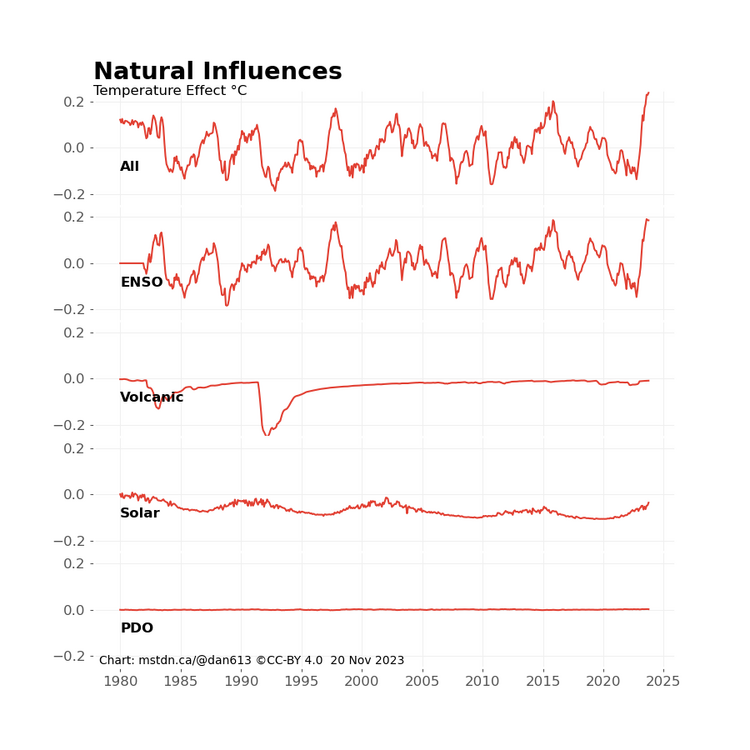
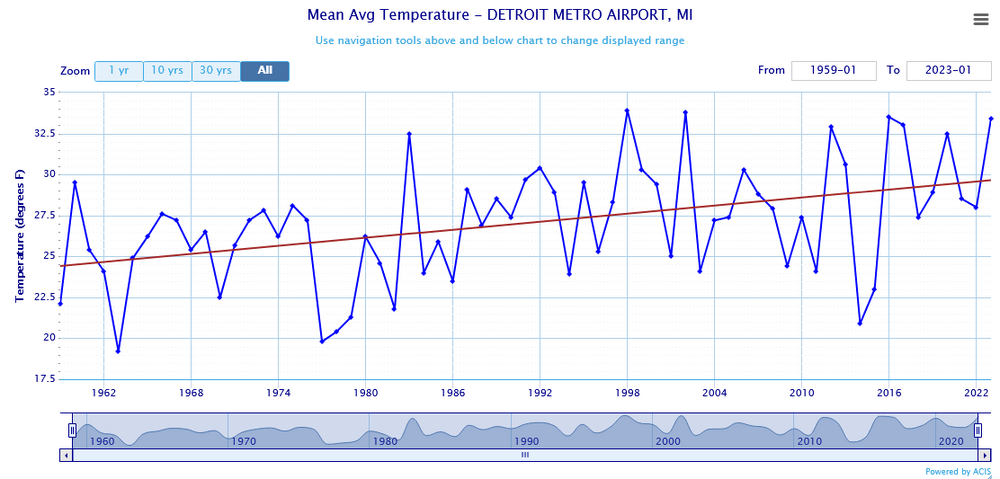
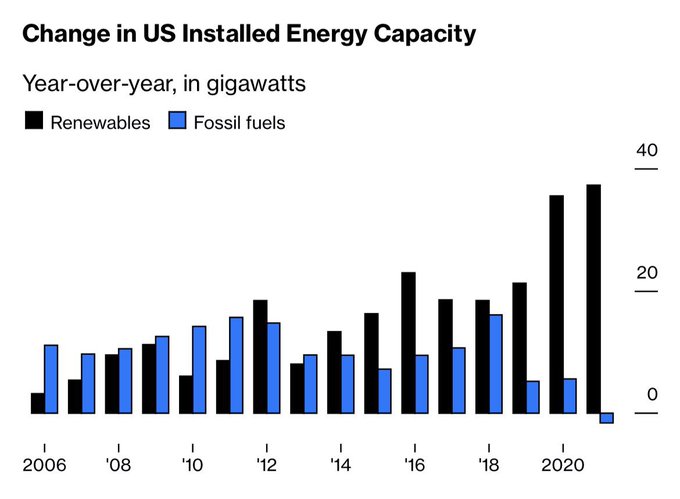
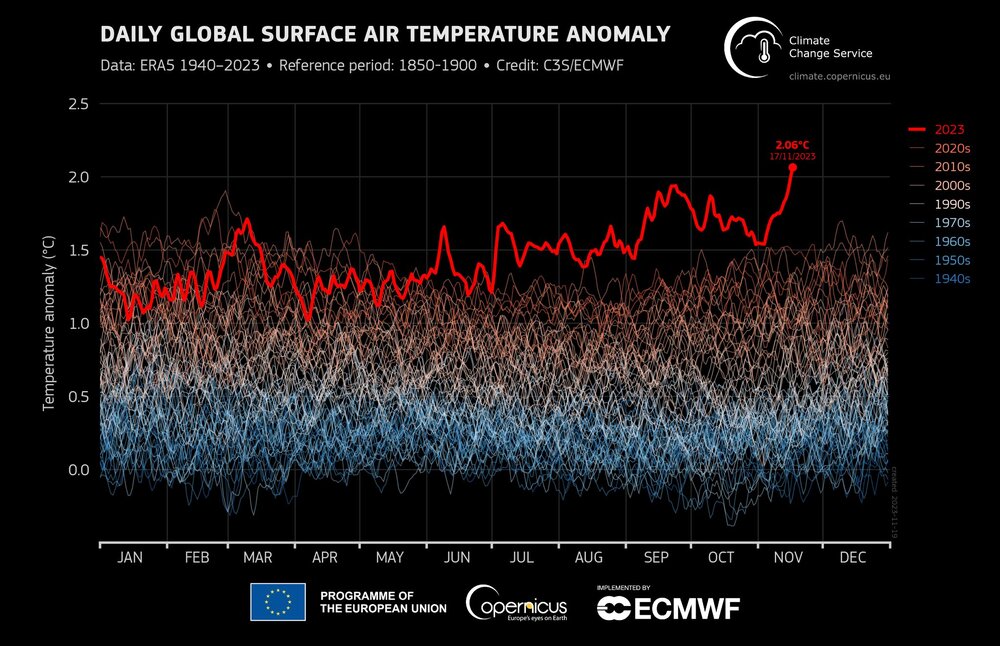
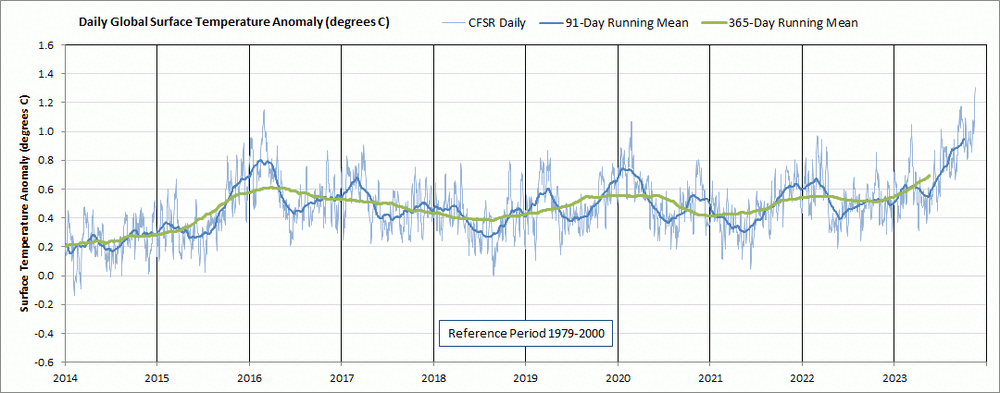

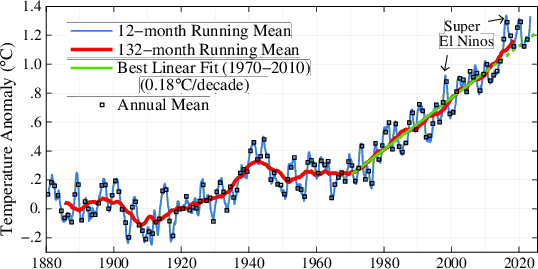
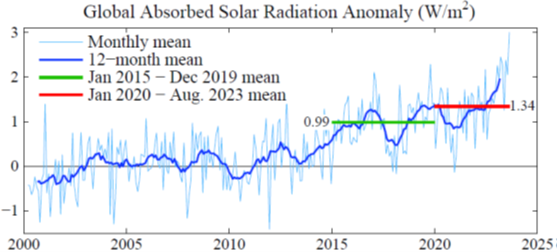
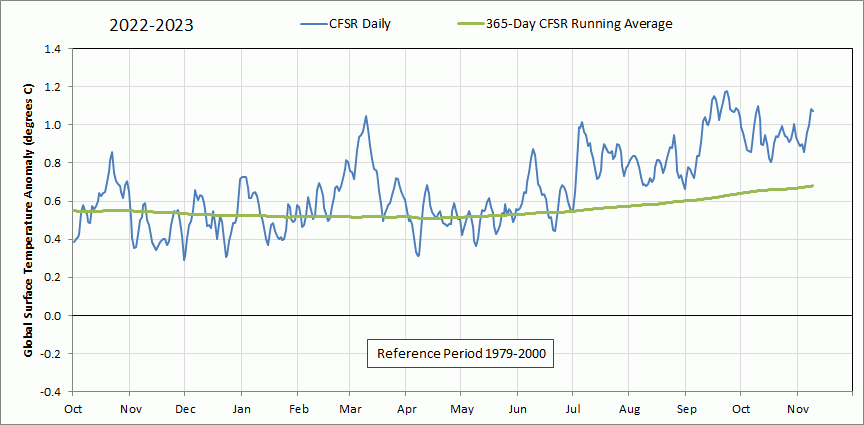
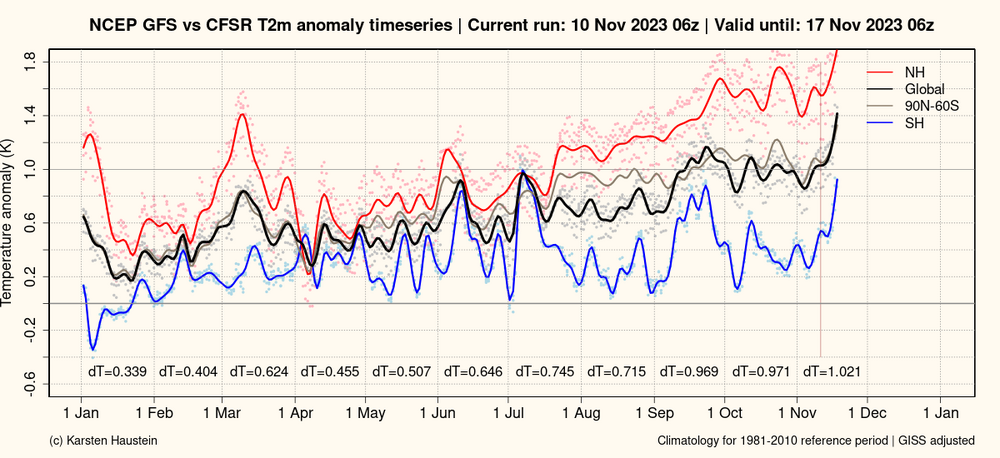

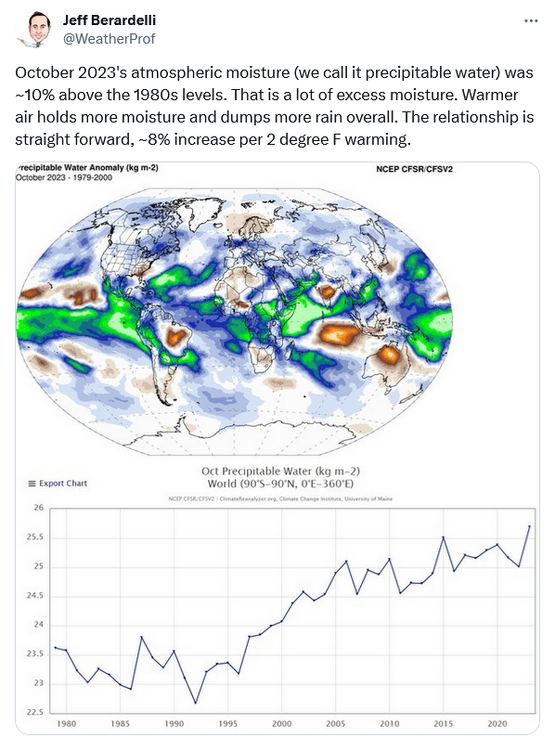
_X.thumb.png.9c07868d3f96d0a196f1aeb9f60833cc.png)
